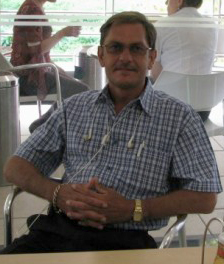Conversation with MarkusPowerful Patient, 2008 Week 15Joyce Graff, host, on webtalkradio.net Beginning April 7, 2008
Joyce talks with Markus Jansen van Vuuren, current chairman of VHL Family Alliance South Africa. They talk about the health care system in South Africa and the prospectives for care for people with rare diseases, and the history of his family in SA since the early 1700's.
In March 2008, Altheada and Fred Johnson went with Joyce to South Africa for the first meeting of the 18th International Affiliate of the VHL Family Alliance International.
Markus van Vuuren and Dr. Lizette van Rensburg had organized the meeting, hosted by Sappi, the world’s largest paper manufacturer, at their headquarters building in Johannesburg. Lunch was provided by the South African Inherited Disease Association (SAIDA).
A report from the meeting, with a collection of photographs from the trip, can be found at http://vhl.org/newsletter/vhl2008/08ayafrica.php
Related shows:Planning - Healthy Traveler - Debrief Our Guest
Markus Jansen van Vuuren is a business analyst with Sappi international headquarters in Johannesburg. He has been working to organize a support group for people with von Hippel-Lindau in South Africa. At this first meeting the group voted unanimously to create a formal group, and appointed a working group to do so. Markus has been a gracious host and an inspiring leader, as you will hear in this interview.
Markus shares his own family’s story, coming from Holland in the early 1700’s to settle in South Africa. He and Joyce talk about the health care system in South Africa and the prospectives for care for people with rare diseases.
About von Hippel-Lindau disease
VHL is a genetic cancer syndrome, which causes vascular tumors of the retina, brain, spinal cord, kidney, pancreas, and adrenal glands. It is difficult to diagnose because of the widely variable expression. Symptoms depend on which tumor you get first, so there is not a clear list of symptoms. Each of the tumors occurs also in the general population as a “sporadic” tumor (just by chance), so even when a tumor is found it is often attributed to a sporadic tumor, and the patient is not warned about the other tumors that may also occur. With a diagnosis, however, there are strategies for finding issues early when they are more likely to be treated successfully.
The rate of diagnosis is low in every country. In countries where there are established VHLFA groups working to raise the visibility of this condition and supporting families, the rate of diagnosis is rising. See http://www.vhl.org About Health Care in South AfricaAs in the United States, private health insurance is provided either through an employer or through private insurance companies, paid by the individual. Unlike the U.S., there is a government-run health care system for people who do not have private insurance, which provides health care for all. Under Apartheid (1948-1990) that meant that white people usually did have health insurance, while blacks and colored peoples usually did not. While that distinction is no longer built into the social structure, and the country is working hard to give equal access to jobs to everyone, socioeconomic levels do not change rapidly. The high rate of unemployment (more than 20%) is a factor as well.
The health care system in South Africa is facing some major challenges. The rate of HIV infection in South Africa is one of the highest in the world, with some 25% of the population infected, and major disagreements even among government health care officials as to whether HIV leads to AIDS, and whether modern drugs or herbal remedies are the better approach. This lack of focus is seriously complicating South Africa’s approach to this crisis. In addition, there are not enough doctors and nurses available in South Africa. Hospitals are overworked and underpaid. While there is good training available for medical professionals in South Africa, salaries are much higher in the West. Canada, Australia, and New Zealand have been recruiting South African medical professionals and luring them away. As one example, some 20% of the doctors in Saskatchewan, Canada, were trained in South Africa.
These and other problems are straining the resources of the health care system. While people with private insurance are generally able to obtain good care, people who use the public health care system are much less likely to obtain the care needed to diagnose and treat any rare disease. While the doctors are willing and able, the overstressed setting in which they work at the government rates is not conducive to thorough analysis of a complex issue. Quote from Dr. Martin Luther King, Jr.
As it is the 40th anniversary of the death of Dr. King, we remember him with this quote: “Of all forms of inequality, injustice in health care is the most shocking and inhumane.”
I hope this story about health care in South Africa will help us to understand better the strengths and weaknesses of your own health care system. The failure of a health care system to solve health problems for all citizens eventually threatens everyone in the society – either through infection or simply through desperation.
DNA testing in South Africa
In this setting, we applaud especially the physicians who have diagnosed and are treating people with all rare diseases in South Africa. In particular, Dr. Lizette van Rensburg has been working with families affected by von Hippel-Lindau disease for more than ten years, helping to identify family members at risk, and assisting other physicians with differential diagnosis for VHL and other diseases through counseling and DNA testing. To obtain DNA testing for VHL and other diseases, people in South Africa or other African nations should contact:
Dr. E. J. van Rensburg
People in other parts of the world can find DNA testing resources for VHL at http://www.vhl.org/dna Thanks to our sponsors
Many thanks to Sappi International, http://www.sappi.com And to the VHL Family Alliance International.
|
